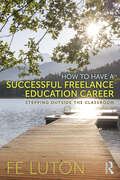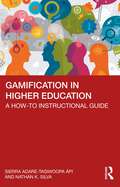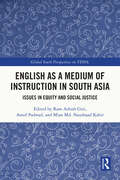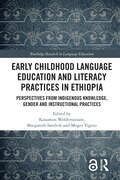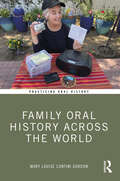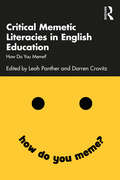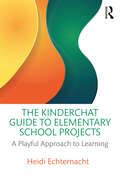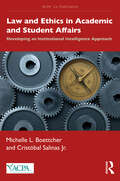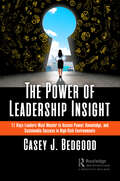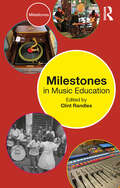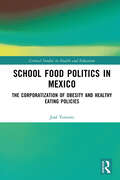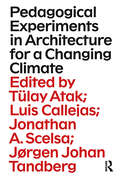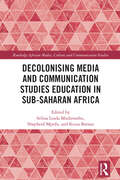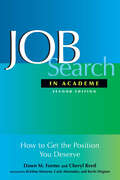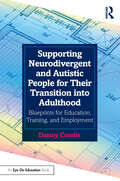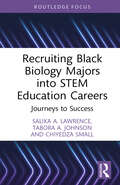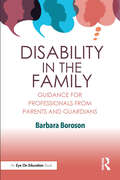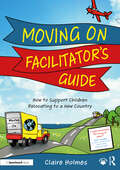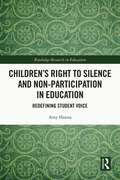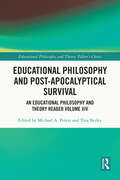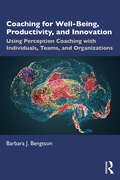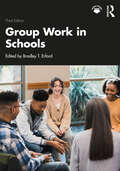- Table View
- List View
How to Have a Successful Freelance Education Career: Stepping Outside the Classroom
by Fe LutonTeaching and education offer a hugely rewarding career - but staying in the classroom for life is not always right for everyone. With a successful teaching career under her belt, Fe Luton made the move from classroom to kitchen table, entering the world of freelance education writing, research, and training as a general all-round creative. How to Have a Successful Freelance Education Career shares the options and practicalities of transitioning to and succeeding in a freelance career. Exploring options for both full-time and part-time freelancing, this essential guide outlines the key skills needed to build a stable career within the freelance education world. Fe Luton explores ways to define yourself, promote yourself and to make sure you stay top of the list when it comes to applications, commissions, and gigs. With chapters filled with practical advice, topics covered include: Life after (or alongside) teaching Developing skills beyond the classroom Pitching and making yourself stand out Building your online persona Career development The dos and don’ts of freelance work This engaging yet highly practical guide is an essential read for anyone looking to reassess their options in the world of education and to expand their professional horizons beyond the classroom.
Gamification in Higher Education: A How-To Instructional Guide
by Sierra Adare-Tasiwoopa ápi Nathan K. SilvaGamification in Higher Education is a user-friendly text for anyone curious about gamification and how it increases student engagement. This book presents actual examples from gamified college courses, furnishing strategies and detailed plans for integrating gamification, regardless of the subject area, discipline, or modality. Moreover, the step-by-step how-to aspects of gamification that do not require expensive, proprietary gaming software set this book apart from others in the field. Gamification in Higher Education explores ways to incorporate real-world simulations and promote critical thinking skill, while focusing on storytelling through which to draw in students and help them get into the game, both literally and figuratively. Additionally, the book examines gamification research and how it can be used to support reluctant learners who normally struggle with complex course content. The authors share their experiences with what has worked and, more importantly, what has not worked in adding gamification to their courses. This key resource offers educators a practical guide that will take instructors step-by-step through the design, development, and implementation of game elements, games, and fully gamified courses without using costly specialized software. Its conversational tone endeavors to put educators, whether novice, mid-career, or veteran, at ease with the process of gamification.
English as a Medium of Instruction in South Asia: Issues in Equity and Social Justice (Global South Perspectives on TESOL)
by Ram Ashish Giri Amol Padwad Kabir, Mian Md. NaushaadThis book examines the ‘English mania phenomenon’ and the complex circumstances of adopting English Medium Instruction (EMI) by South Asian education systems and the effect of an uneven distribution of resources on the already under-resourced countries in the region. Chapters explore linguistic, social, and economic injustices by using an analytic-critical approach to examinations of the place, role, provisions, and practices of EMI in specific English language teaching (ELT) contexts. The book consequently advocates for the wholescale reform of a system, which, the authors argue, is unjust. Ultimately, the book explores socio-cultural, poststructuralist, and English linguistic imperialism theories to contribute a South Asian perspective on the controversy surrounding EMI and examine its role within a wider global discourse on equity and social justice. Critically examining the spread of English in South Asia, this book will be of relevance to researchers, scholars, and postgraduate students in applied linguistics, language education, TESOL, and sociolinguistics.
Early Childhood Language Education and Literacy Practices in Ethiopia: Perspectives from Indigenous Knowledge, Gender and Instructional Practices (Routledge Research in Language Education)
by Kassahun Weldemariam Margareth Sandvik Moges YigezuThis edited volume explores how indigenous knowledges and practices can be instrumental in improving literacy outcomes and teacher development practices in Ethiopia, aiding children’s long-term reading, and learning outcomes. The chapters present research from a collaborative project between Ethiopia and Norway and demonstrate how students can be supported to think pragmatically, learn critically and be in possession of the citizenship skills necessary to thrive in a multilingual world. The authors celebrate multilingualism and bring indigenous traditions such as oracy, storytelling, folktales to the fore revealing their positive impact on educational attainment. Addressing issues of language diversity and systematic ignorance of indigenous literacy practices, the book plays a necessary role in introducing Ethiopia’s cultural heritage to the West and, hence, bridges the cultural gaps between the global north and global south. Arguably contributing one of the first publications on early literacy in Ethiopian languages, this book will appeal to scholars, researchers and postgraduate students studying the fields of early years literacy and language, indigenous knowledge and applied linguistics more broadly.
Family Oral History Across the World (Practicing Oral History)
by Mary Louise Contini GordonFamily Oral History Across the World presents a process for memorializing family histories, bringing together established oral history standards, exploratory research, and narrative data analysis. Based on and using a prequestionnaire and over 40 recorded interviews with people from across six continents, the analysis system used in the book presents material from these interviews that brings alive the experience of the family history journey. One of the guiding principles is to encourage readers to interview family members, but also others outside the family unit, and to produce a family history in whatever format works. The book illustrates this through the inclusion of many unusual formats and stories uncovered. The book is divided into a number of themes that emerged through the analysis of numerical questionnaire and narrative interview data. Parts I, II, and III cover changing family demography, case studies, and factors such as memory, emotion, and ethics. Part IV offers a pliable process and practice guide with input and examples from interviews. It also discusses developing approaches to presenting oral histories from both oral historians and other interviewers and writers, such as journalists. With case studies as well as example guidelines and templates, this volume is ideal both for academics interested in family history as well as professional genealogists and families themselves.
Critical Memetic Literacies in English Education: How Do You Meme?
by Leah Panther Darren CrovitzThis edited collection introduces English and literacy educators to the theoretical, research-based, and practical dimensions of using digital memetic texts—“memes”—in the classroom. Digital memetic texts come with new affordances, particularly as avenues for student creativity, voice, and advocacy. But these texts can also be put to manipulative, propagandistic, and nefarious purposes, posing critical challenges to an informed, democratic citizenry. Grounded in multimodality and critical literacy, this book investigates the fascinating digital dimension of texts, audiences, and meaning, and considers how English educators might take up these conversations in practical ways with students. With authentic examples from teachers and students, this volume provides a road map to researchers and educators—both preservice and in-service—interested in critical and productive uses of these modern phenomena.
The Kinderchat Guide to Elementary School Projects: A Playful Approach to Learning
by Heidi EchternachtThe Kinderchat Guide to Elementary School Projects takes the structure, philosophy, and child-centered, playful approach to learning most commonly seen in early childhood and shares how to scale and apply for the wider elementary school community. From one of the founders of the popular online Kinderchat group, this book shows how inviting play into academic learning forms an essential "back and forth" between application and skill development. Learn how to foster discovery, playfulness, imagination, and spontaneity into the elementary school academic curriculum, while keeping skills in the foreground. Offering lesson plans, scaffolded implementation techniques and methodologies, these unique and approachable projects are ready to use by in-service elementary educators, seasoned professionals, and school leaders.
Law and Ethics in Academic and Student Affairs: Developing an Institutional Intelligence Approach (An ACPA Co-Publication)
by Michelle L. Boettcher Cristóbal Salinas Jr.This valuable resource provides academic and student affairs practitioners with the tools to make informed legal and ethical decisions in their college and university contexts. Law is constantly changing and is interpreted differently from campus to campus based on institutional culture and history. This text provides higher education practitioners with tools to anticipate practical and responsible action, engaging readers in anticipatory and reflective practice. In this text, Boettcher and Salinas introduce the Institutional Intelligence Model, a helpful framework that guides practitioners in examining a wide variety of campus issues. Throughout the book, readers can explore perspectives from current practitioners and utilize case studies to examine specific topics, including admissions, academics, student living, confidential resources, and graduate student experiences. By using the strategies in this book, practitioners will be equipped to successfully navigate legal and ethical issues on their campuses. This text is ideal for graduate students, student and academic affairs professionals, and those in leadership positions responsible for working with and supporting students and staff teams.
The Power of Leadership Insight: 11 Keys Leaders Must Master to Access Power, Knowledge, and Sustainable Success in High-Risk Environments
by Casey J. BedgoodLeadership is a risky business. In the current world, change is the new normal and only constant. As change grows, so does risk. Thus, leaders must be master change agents and master mitigators of risk. But, how will leaders succeed if they don’t measure and lack insight? Simply put, they won’t. Those that are successful in these arenas will ride the waves of success during their tenure on the leadership stage. In contrast, their counterparts will be crushed by the never-ending waves of disruption. Often leaders or those aspiring erroneously view leadership power from a self-interested perspective. They see power through the lens of a title, position, control over others, influence, emotional intelligence and the like. Unfortunately, this view is misaligned and short sighted. Another perspective of leadership is the ability to impact positive change for those around you. In reality, leaders are those that use their gifts, skills and knowledge to educate and empower others in the long run. The purpose of this book is to unveil insight as to the true meaning of leadership power – how to attain it, how to leverage it to add the greatest amount of value to humanity, how to weaponize it to marginalize and eliminate risk and how to share it with others so they can carry the torch once you step off the leadership stage. In this book, readers will learn: How to master the art of change The value of leadership self-advocacy The pearls and pitfalls of leading integration teams The unintended consequences of sharing knowledge The sidewinder effect of misinterpreting root causes of success The leadership test of humility Leadership matchmaking to ensure the right leaders are selected to solve the organization’s problems Leadership Loopholes: The Houdini Effect The risk of underestimating leadership value The risk of not focusing on the right attributes The risk of leading turnarounds
Milestones in Music Education (Milestones)
by Clint RandlesIn ten concise chapters, Milestones in Music Education introduces the key developments and issues that have shaped the field of music education. Designed for undergraduate students, each chapter of the book is written by a different expert, bringing together many leading voices in the field. The ten chosen milestones represent breakthroughs in the field of music education that are relevant to today’s educators, and enable teachers to understand the issues that have shaped the teaching of music over time. Topics covered include the origins of music education as a school subject, the impact of changing technology, the roles of popular music and notation, and racial justice in the music classroom. Featuring action suggestions and discussion questions in each chapter, this accessible book provides students with a foundation in the history and context of music education, and prepares them to engage with the social and philosophical aspects of teaching music as forward-thinking educators. Milestones are a range of accessible textbooks, breaking down the need-to-know moments in the social, cultural, political and artistic development of foundational subject areas. This book is ideal for undergraduate courses in music education.
School Food Politics in Mexico: The Corporatization of Obesity and Healthy Eating Policies (Critical Studies in Health and Education)
by José TenorioIntertwining policy analysis and ethnography, José Tenorio examines how, and why now, the promotion of healthy lifestyles has been positioned as an ideal ‘solution’ to obesity and how this shapes the preparation, sale and consumption of food in schools in Mexico. This book situates obesity as a structural problem enabled by market-driven policy change, problematizing the focus on individual behavior change which underpins current obesity policy. It argues that the idea of healthy lifestyles draws attention away from the economic and political roots of obesity, shifting blame onto an ‘uneducated’ population. Deploying Foucault’s concept of dispositif, Tenorio argues that healthy lifestyles functions as an ensemble of mechanisms to deploy representations of reality, spaces, institutions and subjectivities aligned with market principles, constructing individuals both as culprits for what they eat and the prime locus of policy intervention to change diets. He demonstrates how this ensemble enmeshes within the local cultural and economic conditions surrounding the provisioning of food in Mexican schools, and how it is contested in the practices around cooking. Expanding the conversation on the politics of food in schools, obesity policy and dominant perspectives on the relation between food and health, this book is a must-read for scholars of food and nutrition, public health and education, as well as those with an interest in development studies and policy enactment and outcomes.
Pedagogical Experiments in Architecture for a Changing Climate
by Tülay Atak Luis Callejas Jonathan Scelsa Jørgen TandbergThis book presents a series of pedagogical experiments translating climate science, environmental humanities, material research, ecological practices into the architectural curriculum. Balancing the science and humanities, it exposes recent pedagogical experiments from renown educators, while also interrogating a designer’s agency between science and speculation in the face of climate uncertainty. The teaching experiments are presented across four sections: Abstraction, Organization, Building, and Narrative, exposing core parts of an architect’s education and how educators can simultaneously provide fundamental skills and constructive literacy while instigating environmental sensibilities. Chapters cover issues such as an unstable hydrosphere, water infrastructure, remediating materials, methods of disassembly and adaptive reuse, as well as constructing new aesthetic categories of climate change, and implementing oral histories of construction, among many others. Written and edited by expert design educators actively engaged in experimenting in new forms of pedagogy, this book will be of great use to architecture instructors at all levels looking to renew their teaching practices to more directly address the climate emergency. It will also appeal to those academics across the built environment interested in the ways design can affect and adapt to climate change.
Decolonising Media and Communication Studies Education in Sub-Saharan Africa (Routledge African Media, Culture and Communication Studies)
by Selina Linda Mudavanhu Shepherd Mpofu Kezia BatisaiThe book provides insights on decolonising media and communication studies education from diverse African scholars at different stages of their careers. These academics, located on the continent and in the diaspora, share an interest in decolonising higher education broadly and media and communication studies teaching and learning in particular. Although many African countries gained flag independence from different European colonial powers between the 1950s and the 1970s, this book argues that former colonies remain ensnared in a colonial power matrix. Many African universities did not jettison ways of teaching and learning established during colonialism, and even those journalism, communication, and media studies training programmes which were established after the attainment of flag independence did not place decolonial agendas at the front and centre when setting them up. Starting with big picture thematic questions around decolonisation, the book goes on to consider what the implications of change would be for students and instructors, before reflecting on how far it is possible to decolonise curricula and syllabi and what this might look like in practice across a range of subject areas and country contexts. Overall, this book presents a nuanced picture of what a decolonised media and communication studies education could look like in sub-Saharan Africa. This book is essential for researchers in Africa in disciplines such as media and communication studies, journalism, film studies, cultural studies, and higher education studies. More broadly, the concepts and ideas on decolonising teaching and learning discussed in the book are relevant to instructors in any discipline who are interested in doing the decolonial work of contesting coloniality.
Job Search In Academe: How to Get the Position You Deserve
by Dawn M. Formo Cheryl ReedBuilding on the success of the first, this new edition has been updated to cover the latest hiring trends, changing economic circumstances, and feedback from readers. The authors have expanded the book to deal with issues faced by minority candidates, and have added contributions from scientists to cover such issues as negotiating faculty contracts to ensure adequate lab space and resources. They give more emphasis to applying for non-academic jobs and offer case study scenarios of candidates who have followed both academic and non academic paths. The authors urge readers to go develop a philosophy statement for research and service, as well as for teaching. They explain what’s involved in applying for joint positions, offer advice on applying for administrative jobs outside the academy, and prepare the reader for first year academic and corporate performance reviews. They have updated the resources, references, examples and scenarios. This book covers the process for Master’s- and Ph.D.-level job-seekers of all disciplines: from identifying sources of information about positions, to advising on the preparation of effective CVs and portfolios, through guidance on the process of interview to final negotiation of terms. Its invaluable advice is informed by the authors’ experiences in both academic and corporate arenas, as well as by the narratives of current and recent job seekers. The authors cover the full spectrum of potential positions—adjunct, visiting, temporary and tenure-track faculty appointments—at-year and 2-year institutions. This book includes sample application letters and vitae, a model for job search workshop, and a rich list of resources both in print and on-line. An accompanying Web site offers a wealth of information on locating job postings, complete with hot links to major sites, both general and discipline-specific; presents eight sample application packets by successful humanities, social sciences, and sciences candidates, with accompanying comments on key features by the book’s authors; and an extensive listing of useful books and online resources. While being realistic about the trends in higher education, the decline in tenure-track positions, and greater competition for available positions, the authors actively combat the gloom and doom approach of competing books by emphasizing that readers have it in their power to adopt strategies, and take actions and choices, that can greatly improve their chances of success. The authors aim to help candidates see what they already have and how to get that across as clearly as possible to potential hiring committees. Contact the Authors: Share your story! We hope to continue collecting timely narratives to keep Job Search useful, and we welcome your e-mails. Dawn can be reached at dformo@csusm.edu and Cheryl at drcreed@catsforchange.org. We also welcome the opportunity to offer job search workshops and individual coaching in person and online.
Arriving Well Activity Book: Therapeutic Activities to Support Kids Aged 6-12 who have Moved to a New Country (Moving On)
by Claire HolmesMoving from country to country is no small feat. This activity book is designed for use with children aged 6-12 to help those on the move to navigate the process of global transition smoothly. Based on the latest relocation and transition research, wellbeing boosting strategies are shared for transition and beyond. Children are introduced to mindful activities and are encouraged to use their creativity by annotating and illustrating the pages as they move through the book, allowing them to be an active participant in their move. Arriving Well Activity Book helps the child settle in their new place, to reflect on the move and understand that change is a part of life. Full of valuable strategies to boost wellbeing as they move forward, the text highlights top tips for settling in. The book normalises mixed feelings, helping the child to understand the process of transition and reflect on their sense of control. This book can be used effectively alongside: Leaving Well Activity Book which helps children to reflect on how they feel about the move, to remember other moves and understand that change is a part of life. Moving On Facilitator’s Guide which offers guidance notes and prompts to help bring out the best experience for the child and is designed to help the adult feel confi dent in their delivery and in responding to any questions. It contains key points to consider, examples of ‘what you could say’, as well as explains the theory behind the workbook activities. Acting as a tool for engagement, Arriving Well Activity Book will help children come to terms with the move and help adults support children through the arrival and settling in period.
Supporting Neurodivergent and Autistic People for Their Transition into Adulthood: Blueprints for Education, Training, and Employment
by Danny CombsThis trailblazing resource teaches educators how to support the strengths of children and teens on the autism spectrum as they transition into their lives as adults. Offering ideas and solutions to counter the currently steep unemployment rate for those on the autism spectrum in the United States, each chapter takes a strength- and asset-based approach to autism and neurodivergent education, training, and employment. The author draws upon his lived experience as a parent to a neurodivergent child to provide unique and proven strategies with real-life applications. Secondary and post-secondary educators can learn to refresh their current standards of practice and the concept of what is possible and appropriate in working with students on the autism spectrum.
Recruiting Black Biology Majors into STEM Education Careers: Journeys to Success (Routledge Research in STEM Education)
by Salika A. Lawrence Tabora A. Johnson Chiyedza SmallThis book addresses issues related to the recruitment, preparation, and retention of STEM teachers. Focusing on recruitment specifically, it explores the strategies used to introduce biology majors to the teaching profession, increase their interest in teaching, and support their transition into teaching. Taking the Transformative and Innovative Practices in STEM Education (TIPS) program as a case study, it draws upon a wide range of data sources to contextualize the experiences of program participants, including reflections from participants and program staff, pre- and post- surveys, focus groups, and annual interviews. The authors present insights about their decision-making and use the data to help create illustrative examples of the STEM majors of color who choose to pursue teaching and to explore why others decide not to pursue teaching. It foregrounds the importance of recruiting STEM teachers of color for urban districts, the role of culture and identity in the decision-making process, and the role played by professional development and mentoring. With emphasis on recruiting STEM majors at a Predominantly Black Institution (PBI), the book ultimately provides strategies for increasing collaboration across departments, supporting and mentoring students, and addressing cultural and institutional barriers that STEM majors face when transitioning into teacher education. As such, it will appeal to STEM education and teacher education scholars, as well as program directors, deans of Schools of Education, and deans of Schools of Science.
Disability in the Family: Guidance for Professionals from Parents and Guardians
by Barbara BorosonThis insightful guide shows professionals how to collaborate with parents and guardians of children with disabilities in empathic, respectful, knowledgeable, and supportive ways. Packed with first-hand accounts and advice from parents and guardians, this book shines a light on lived experiences and reveals paths toward meeting families where they are in order to move forward together. Boroson emphasizes that appreciating the real needs of these families is a crucial step beyond mere adherence to a generic set of professional best practices or principles. Whether working in the field of medicine, education, law, mental health, or related services—in any capacity—readers will come away with the holistic knowledge, inclusive language, productive strategies, and differentiated understanding needed to work effectively with the diverse families they serve. Included is a robust array of resources for families, such as books, articles, associations, organizations, and support networks, along with a website for additional, up-to-date resources.
Moving On Facilitator’s Guide: How to Support Children Relocating to a New Country (Moving On)
by Claire HolmesMoving On Facilitator’s Guide is designed to accompany the Leaving Well and Arriving Well activity books. Based on the latest relocation and transition research, the guide builds the confidence of adults in delivery of the activity books to share wellbeing boosting strategies for transition and beyond, both for the child and the supporting adult. This practical guide offers guidance notes and prompts to help bring out the best experience for the child. It will help the adult feel confident in responding to any questions, including key points to consider and examples of ‘what you could say’. It goes on to explain the theory behind the activities from the workbooks and includes examples and quotes from other ex-pat children woven through the text. The guide can be used effectively with: Leaving Well Activity Book which helps children to reflect on how they feel about the move, to remember other moves and understand that change is a part of life. Arriving Well Activity Book which can be used on its own or following on from Leaving Well and continues to move through this process, helping the child to settle when they have arrived in their new country. Inspired by research, this invaluable guide will help teachers, practitioners, and parents support children on the move to leave and arrive well.
Leaving Well Activity Book: Therapeutic Activities to Support Kids Aged 6-12 who are Moving to a New Country (Moving On)
by Claire HolmesMoving from country to country is no small feat. This activity book is designed for use with children aged 6-12 to help those on the move to navigate the process of global transition smoothly. Based on the latest relocation and transition research, wellbeing boosting strategies are shared for transition and beyond. Children are introduced to mindful activities and are encouraged to use their creativity by annotating and illustrating the pages as they move through the book, allowing them to be an active participant in their move. Leaving Well Activity Book helps children to reflect on how they feel about the move, to remember other moves and understand that change is a part of life. Full of valuable strategies to boost wellbeing as they move forward, the text highlights top tips for expressing feelings that will help children prepare for departure. The book normalises mixed feelings, helping the child acknowledge their hopes and fears, and reflect on their sense of control. This book can be used effectively alongside: Arriving Well Activity Book which helps the child settle in their new place, to reflect on the move and understand that change is a part of life. Moving On Facilitator’s Guide which offers guidance notes and prompts to help bring out the best experience for the child and is designed to help the adult feel confident in their delivery and in responding to any questions. It contains key points to consider, examples of ‘what you could say’, as well as explains the theory behind the workbook activities. Acting as a tool for engagement, Leaving Well Activity Book will help children come to terms with the move and help adults support children preparing to leave for a new country.
Children’s Right to Silence and Non-Participation in Education: Redefining Student Voice (Routledge Research in Education)
by Amy HannaThis insightful book re-examines the concept of student voice through an exploration of children’s implicit rights to silence and non-participation. By considering what remains unspoken but is voiced through silence, this book theorises silence through the lens of power. Responding to calls for more critical approaches to children's participation under the UN Convention on the Rights of the Child, this unique exposition of silence ventures beyond traditional notions of voice as a defining term for justice and participation, and traditional understandings of silence as powerlessness. Instead, this book presents young people’s uses and understandings of silence at school as an instrument of power. Based on empirical research, the book reconceptualises children’s participation rights through silence. Addressing an important gap in the literature on student voice and children’s participation, this book is a valuable resource for academics, researchers, and postgraduate students in the fields of children’s human rights, childhood studies, and educational philosophy.
Educational Philosophy and Post-Apocalyptical Survival: An Educational Philosophy and Theory Reader Volume XIV (Educational Philosophy and Theory: Editor’s Choice)
by Michael A. Peters Tina BesleyThis collection concerns educational philosophy and post-apocalyptical survival. This 14th volume in the Editor's Choice series provides insights into the philosophy of education as it relates to the concepts of civilizational collapse, discourses of decline, educating for survival amid climate emergency, cultural apocalypse and the pandemic. It is based on a series of editorials and articles published in the Educational Philosophy and Theory journal through its 55-year history. The articles, written by Editor Michael Peters and colleagues, explore the concept of global apocalypse from the educational philosophy lens. It will be of interest to scholars in philosophy of education and anyone who is working in the field of post-apocalyptic studies.
Coaching for Well-Being, Productivity, and Innovation: Using Perception Coaching with Individuals, Teams, and Organizations
by Barbara J. BengtsonThis book presents Perception Coaching® as a model that enables coaches to support their clients in understanding the impact of their attitudes in themselves, helping individuals, teams, and organizations reduce their inherent biases to more effectively collaborate, innovate, and support each other. Dr. Bengtson approaches coaching through the lens of educational psychology in three parts, starting with understanding self and others, moving on to interactions and teams, and finally culture and organizations. Filled with strategies throughout, the book focuses on examining natural patterns of thinking and acting to uncover perceptual filters so that the unexamined and unexplained may be brought to light and understood. Covering topics such as emotional intelligence and communication styles, the book aims to help coaches support their clients pursue purpose, increase inclusion, and create innovation. This book is invaluable reading for current and aspiring coaches and non-profit and corporate leaders, as well as talent development professionals.
Group Work in Schools
by Bradley T. ErfordThe third edition of Group Work in Schools is designed to prepare counselors in school settings to successfully implement task, psycho-educational, and counseling groups in public and private educational settings. The chapters of this book are written by experts in the counseling profession and cover foundational, systemic, and applied topics essential to training top-caliber school counselors. Providing state of practice information and case examples that help readers see how theory translates to practice in the field, additions to this newly updated third edition include discussion topics, activities, case examples, practitioner perspectives, and integrated CACREP (2024) standards and learning outcomes, as well as an overall update to reflect the most recent research and knowledge, including pandemic coverage and advances in technology. Updated comprehensively and thoughtfully and featuring a wide range of contributor perspectives, the much-anticipated third edition of this book is essential reading for school counselors-in-training.
Developing Intercultural Competence “at Home”: Domestic Students’ Experiences in Chinese Universities
by Xiaoqing Wang Kun DaiThis book presents a mixed-methods study that explores the development of intercultural competence among local Chinese students in Chinese universities, using Deardorff’s process model of intercultural competence as a theoretical framework. In the global higher education context, “internationalization at home” is significant in (re)shaping educational practices, especially under the influence of the COVID-19 pandemic. Chinese higher education is also actively engaged in domestic internationalization. Specifically, this book explores the factors that influence Chinese students’ development of intercultural competence and their understanding of it in the context of internationalization at local Chinese universities. The findings suggest that many universities in China are trying to improve domestic students’ intercultural competence through various strategies, such as foreign language learning, extracurricular intercultural communication activities, and international cooperation programs. Notably, the effects are diverse. Based on these findings, this book also discusses the potential theoretical, practical, and policy implications. This book will be an excellent resource for students and scholars in comparative and international education, student development, cultural studies, Chinese studies, and those interested in Chinese higher education.
